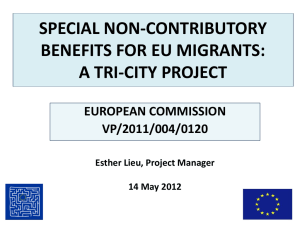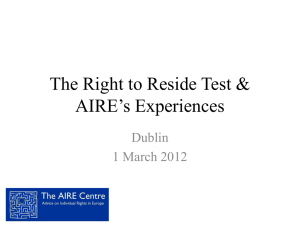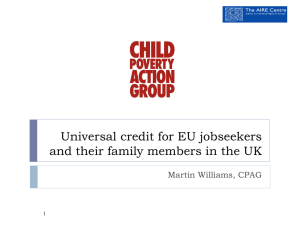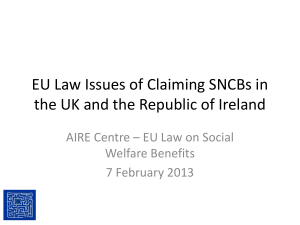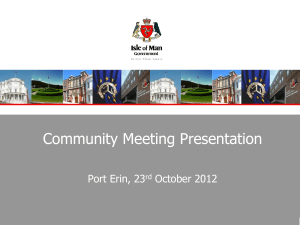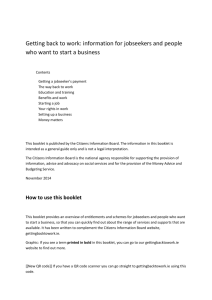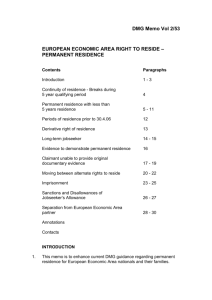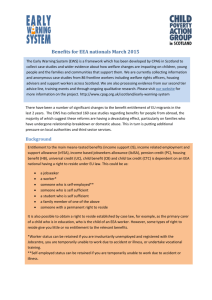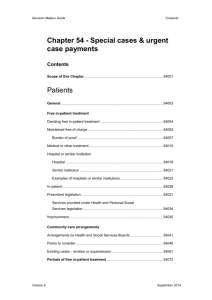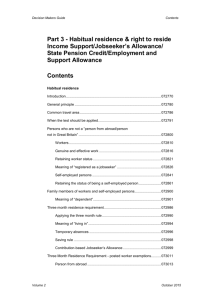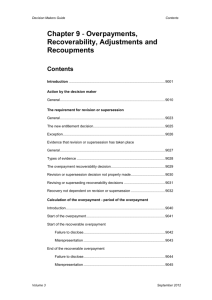Patmalniece and the Right to Reside Test
advertisement
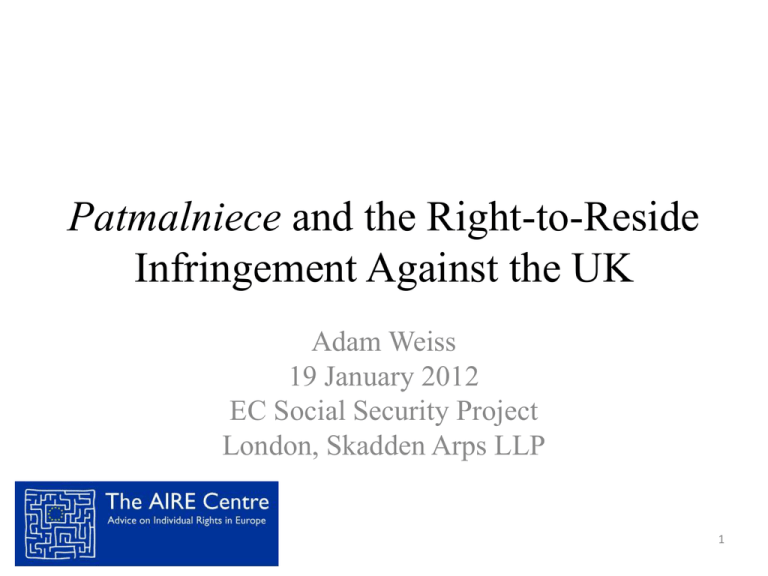
Patmalniece and the Right-to-Reside Infringement Against the UK Adam Weiss 19 January 2012 EC Social Security Project London, Skadden Arps LLP 1 The AIRE Centre Mission: To promote awareness of European law rights and assist marginalised individuals and those in vulnerable circumstances to assert those rights. Activities: • Take cases to the European Court of Human Rights (including cases on behalf of non-EU trafficking victims facing expulsion). • Provide free legal advice to individuals and their advisers on their rights under EU law (mostly EU law on the free movement of persons). This includes approximately 400 advices on EU free movement law each year. 2 Objectives of This Session 1. Familiarise you with the provisions of EU Regulation 883/04 relevant to special non-contributory benefits. 2. Familiarise you with the UK’s right-to-reside test and the Patmalniece judgment of the UK Supreme Court. 3. Familiarise you with the infringement proceedings the European Commission has initiated (in the form of a ‘reasoned opinion’) against the UK. 3 EU Regulation 883/04 Article 70 1. This Article shall apply to special non-contributory cash benefits which are provided under legislation which, because of its personal scope, objectives and/or conditions for entitlement, has characteristics both of the social security legislation referred to in Article 3(1) and of social assistance. 2. For the purposes of this Chapter, ‘special non-contributory cash benefits’ means those which: (a) are intended to provide either: (i) supplementary, substitute or ancillary cover against the risks covered by the branches of social security referred to in Article 3(1), and which guarantee the persons concerned a minimum subsistence income having regard to the economic and social situation in the Member State concerned; or (ii) solely specific protection for the disabled, closely linked to the said person's social environment in the Member State concerned, and (b) where the financing exclusively derives from compulsory taxation intended to cover general public expenditure and the conditions for providing and for calculating the benefits are not dependent on any contribution in respect of the beneficiary. However, benefits provided to supplement a contributory benefit shall not be considered to be contributory benefits for this reason alone, and (c) are listed in Annex X. 3. Article 7 and the other chapters of this Title shall not apply to the benefits referred to in paragraph 2 of this Article. 4. The benefits referred to in paragraph 2 shall be provided exclusively in the Member State in which the persons concerned reside, in accordance with its legislation. Such benefits shall be provided by and at the expense of the institution of the place of residence. 4 Analysing Article 70 • “Characteristics of social security and social assistance”: they look like welfare benefits but also look like one or more of the following: sickness benefits; maternity and equivalent paternity benefits; invalidity benefits; old-age benefits; survivors’ benefits; benefits in respect of accidents at work and occupational diseases; death grants; unemployment benefits; pre-retirement benefits; family benefits. • “Place of residence”: this means habitual residence, which the ECJ defined in Case C-90/97 Swaddling: The phrase 'the Member State in which they reside' in Article 10a of Regulation No 1408/71 refers to the State in which the persons concerned habitually reside and where the habitual centre of their interests is to be found. In that context, account should be taken in particular of the employed person's family situation; the reasons which have led him to move; the length and continuity of his residence; the fact (where this is the 5 case) that he is in stable employment; and his intention as it appears from all the circumstances. § 29 UK Special Non-Contributory Benefits • State Pension Credit (subsistence benefit for those of pension age). • Income Support (subsistence benefit for lone parents and certain others). • Income-based Jobseeker’s Allowance (subsistence benefit for those seeking work). • Disability Living Allowance (mobility component). • Income-related Employment and Support Allowance (subsistence benefit for those unable to work). (Later added to Annex X.) 6 Right-to-Reside Test Affects: • State Pension Credit • Income Support • Income-based Jobseeker’s Allowance Income-related Employment and Support Allowance (not Disability Living Allowance) • Other social security benefits: • Child Tax Credit • Child Benefit • Health and Pregnancy Grant • Other (pure social assistance) benefits: • Housing Benefit • Council Tax Benefit Council housing and homelessness assistance • Working Tax Credit 7 Income Support Regulations (same applies to the other three special non-contributory benefits) 21AA.—(1) ”Person from abroad” means, subject to the following provisions of this regulation, a claimant who is not habitually resident in the United Kingdom, the Channel Islands, the Isle of Man or the Republic of Ireland. (2) No claimant shall be treated as habitually resident in the United Kingdom, the Channel Islands, the Isle of Man or the Republic of Ireland unless he has a right to reside in (as the case may be) the United Kingdom, the Channel Islands, the Isle of Man or the Republic of Ireland other than a right to reside which falls within paragraph (3). (3) A right to reside falls within this paragraph if it is one which exists by virtue of, or in accordance with, one or more of the following— (a)regulation 13 of the Immigration (European Economic Area) Regulations 2006; (b)regulation 14 of those Regulations, but only in a case where the right exists under that regulation because the claimant is— (i)a jobseeker for the purpose of the definition of “qualified person” in regulation 6(1) of those Regulations, or (ii)a family member (within the meaning of regulation 7 of those Regulations) of such a jobseeker; (c)Article 6 of Council Directive No. 2004/38/EC; or (d)Article 39 of the Treaty establishing the European Community (in a case where the claimant is a person seeking work in the United Kingdom, the Channel Islands, the Isle of Man or the Republic of Ireland). (4) A claimant is not a person from abroad if he is— (a)a worker for the purposes of Council Directive No. 2004/38/EC; (b)a self-employed person for the purposes of that Directive; (c)a person who retains a status referred to in sub-paragraph (a) or (b) pursuant to Article 7(3) of that Directive; (d)a person who is a family member of a person referred to in sub-paragraph (a), (b) or (c) within the meaning of Article 2 of that Directive; (e)a person who has a right to reside permanently in the United Kingdom by virtue of Article 17 of that Directive; (f)a person who is an accession State worker requiring registration who is treated as a worker for the purpose of the definition of “qualified person” in regulation 6(1) of the Immigration (European Economic Area) Regulations 2006 pursuant to regulation 5 of the Accession (Immigration and Worker Registration) Regulations 2004; … 8 How the Right-to-Reside Test Works If you are a worker or self-employed (or have retained worker or self-employed status), or are a permanent resident, or are the family member of an EEA national in one of those categories, you will generally pass the right-to-reside test (and indeed may be passported through the whole habitual residence test). If you are a jobseeker, you will also have a right-to-reside for the purposes of incomebased Jobseeker’s Allowance (although accession nationals do/did not necessarily have the possibility of exercising a right to reside as jobseekers). Anyone else will be told you ‘do not have a right to reside for benefits purposes’. 9 Two Kinds of Challenges Litigation in the UK courts – major cases • Abdirahman [2007] EWCA Civ 697 • Kaczmarek [2008] EWCA Civ 1310 • Zalewska [2008] UKHL 67 • Patmalniece [2011] UKSC 11 Complaint to the European Commission from AIRE and ILPA • June 2009 – initial complaint made • October 2009 – meeting with the Commission • February 2010 – Commission view received • June 2010 – LFN sent to UK • September 2011 – reasoned opinion sent to UK • Now - ??? 10 Pre-Patmalniece Cases • Abdirahman: argued under articles 12 and 18 TEC. • Kaczmarek: similar, also refused. • Zalewska: dealt with the Worker Registration Scheme for A8 nationals, 3-2 judgment finding that a victim of domestic violence could be refused Income Support. 11 Patmalniece The argument was put forward that the right-to-reside test (which British and Irish citizens, but not other EU citizens, always pass) violates Article 3(1) of Regulation 1408/71 (now Article 4 of Regulation 883/04): Subject to the special provisions of this Regulation, persons resident in the territory of one of the Member States to whom this Regulation applies shall be subject to the same obligations and enjoy the same benefits under the legislation of any Member State as the nationals of that State. 12 Patmalniece - judgment Their Lordships found unanimously that there was indirect discrimination (unanimous), and found, 4-1, that the discrimination was justified. [T]he Secretary of State's purpose was to protect the resources of the United Kingdom against resort to benefit, or social tourism by persons who are not economically or socially integrated with this country. This is not because of their nationality or because of where they have come from. It is because of the principle that only those who are economical or socially integrated with the host Member State should have access to its social assistance system. The principle, which I take from the decision in Trojani, is that it is open to Member States to say that economical or social integration is required. A person's nationality does, of course, have a bearing on whether that test can be satisfied. But the justification itself is blind to the person's nationality. The requirement that there must be a right to reside here applies to everyone, irrespective of their nationality. (Lord Hope, § 52) 13 The Commission’s View – excerpt from February 2010 letter 14 Further Steps the Commission has taken • • July 2010 – the Commission sent a ‘letter of formal notice’ to the UK. September 2011 (after Patmalniece) – the Commission sent a ‘reasoned opinion’ to the UK, giving a deadline of end November 2011. Article 258 of the Treaty on the Functioning of the European Union: If the Commission considers that a Member State has failed to fulfil an obligation under the Treaties, it shall deliver a reasoned opinion on the matter after giving the State concerned the opportunity to submit its observations. If the State concerned does not comply with the opinion within the period laid down by the Commission, the latter may bring the matter before the Court of Justice of the European Union. 15 Consequences of the right-to-reside test • In London, it is estimated that between 25% and 40% of the homeless population are EU citizens from the new Member States. • Survivors of domestic violence, victims of human trafficking, pregnant women and people with serious illnesses are left destitute. 16 Case Studies • • • Mr B is from Latvia. He has lived in the UK, and worked on and off, for over six years. He has drug-resistant tuberculosis. He applied for income-related Employment and Support Allowance and was refused. We are waiting for his appeal before the first-tier tribunal to be decided. Ms S is a French citizen married to a British Citizen. He worked, but she never did. She has lived in the UK for over five years. When her husband when to prison for one month, she applied for Income Support and was refused. Mr J is a Polish citizen who was self-employed for over a year before his self-employed activity dried up. He sought and was refused income-based Jobseeker’s Allowance. 17 What we are doing in the meantime… • Trying to squeeze people into the right-toreside test. • Trying to convince UK courts/tribunals. 18 Questions? My contact information: aweiss@airecentre.org 19
